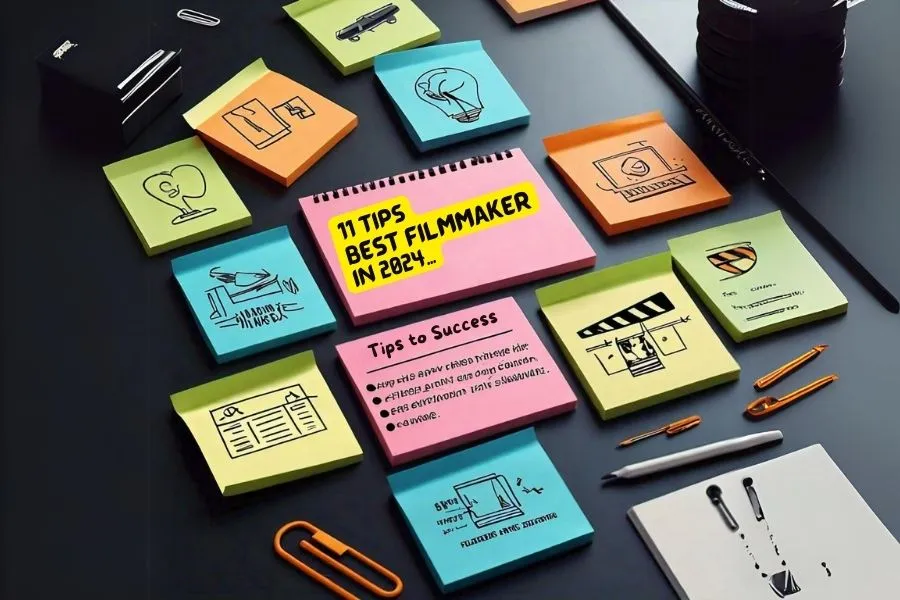Table of Contents
Introduction
Lights, camera, action! In the ever-evolving world of filmmaking, 2024 promises to be a year brimming with innovation and creativity. Whether you’re an aspiring filmmaker or a seasoned pro looking to up your game, there’s always room for growth and improvement. This blog is your ultimate guide to becoming the best filmmaker in 2024. From mastering storytelling to embracing the latest technologies, we’ve got you covered with these 11 invaluable tips.
1. Improve Storytelling Skills

At the core of each and every extraordinary film is a convincing story. It’s the backbone that supports your visual and auditory elements. So, how do you tell a story that captivates and resonates?
Tips for Improving Storytelling:
- Read and Write Regularly: Engage with a variety of genres and styles to broaden your narrative horizons.
- Study Screenwriting: Dive into screenwriting books and courses to understand structure and pacing.
- Analyze Films: Watch critically acclaimed films and dissect their storytelling techniques.
2. Master the Technical Aspects
While a great story is crucial, technical proficiency ensures your vision comes to life seamlessly. From cinematography to sound design, mastering these elements can set you apart.
Key Technical Skills to Learn:
Camera Operation: Understanding different types of cameras and their functionalities.
Example: Understanding the different types of cameras available is crucial. DSLRs, mirrorless cameras, and cinema cameras each have their strengths and weaknesses. Learn about their functionalities, including frame rates, codecs, sensor sizes, and how they impact the final image.
Lighting: Learning how to manipulate light to create mood and atmosphere.
Example: Lighting is a powerful storytelling tool. Learn how to manipulate light to create mood, atmosphere, and draw attention to specific elements within the frame. Explore three-point lighting setups, using natural light, and how color temperature affects the overall look of your film.
Editing Software: Becoming proficient in software like Adobe Premiere Pro or Final Cut Pro.
Example: Editing software allows you to weave together your footage, sound, and visual effects to create the final film. The most used software for editing are Adobe Premiere Pro and Final Cut Pro. Learn the basics of editing, including cutting footage, adding transitions, color correction, and audio mixing.
3. Invest in Quality Equipment
Your equipment doesn’t define you, but it sure can enhance your work. Investing in quality gear can significantly impact your filmmaking process.
Essential Equipment for Filmmakers:
Camera: A high-quality camera suited to your style and budget.
For example, a mirrorless camera like the Sony a7 series or a DSLR like the Canon EOS 90D are great options for beginners, offering excellent image quality and interchangeable lenses. High-end cinema cameras like ARRI Alexa are industry standards for more professional use.
Audio Equipment: Reliable microphones and audio recorders.
Examples:
- Microphones: A shotgun microphone like the Rode VideoMic Pro is excellent for capturing clear directional audio. Lavalier microphones (clip-on mics) are great for interviews or discreet sound capture.
- Audio recorder: A dedicated audio recorder can provide cleaner audio and more control compared to relying on the camera’s internal microphone. Zoom H4n Pro is a popular choice for its portability and features.
Lighting Kits: Versatile lighting options for different scenes.
Examples: A basic lighting kit might include three LED light panels and stands. These are versatile and dimmable for various lighting setups. Softboxes can be added to diffuse light and create softer shadows.
4. Stay Updated with Industry Trends
The film industry is dynamic, with trends that can influence both storytelling and production techniques. Keeping up with these trends can give you a competitive edge.
How to Stay Informed:
Follow Industry News: Subscribe to film industry newsletters and blogs.
- Variety (https://variety.com/)
- The Hollywood Reporter (https://www.hollywoodreporter.com/)
- IndieWire (https://www.indiewire.com/)
- Filmmaker Magazine (https://filmmakermagazine.com/)
Attend Film Festivals: Participate in festivals to see the latest in filmmaking.
Join Filmmaking Communities: Engage with online forums and groups.
5. Network with Industry Professionals
Filmmaking isn’t a solitary endeavor. Building a network of industry professionals can open doors to collaborations, funding, and mentorship.
Tips for Effective Networking:
Attend Industry Events: Attend different workshops, seminars, and film festivals.
Examples: Film festivals (Sundance, Cannes, Toronto), industry conferences (South by Southwest, Comic-Con), workshops on specific filmmaking skills (screenwriting, directing, cinematography)
Use Social Media: Connect with professionals on platforms like LinkedIn and Twitter.
Examples: LinkedIn (connect with professionals, join industry groups), Twitter (follow filmmakers and companies, participate in industry chats using relevant hashtags), Instagram (showcase your work and connect with a visual audience)
Collaborate on Projects: Work on indie projects to meet like-minded individuals.
Examples: Volunteer at a local film festival, respond to calls to collaborate on short films or web series, connect with other filmmakers online to find project partners.
6. Develop a Unique Style
A unique style can make your work recognizable and memorable. It’s what sets your unique identity from other filmmakers.
How to Develop Your Style:
Experiment: Try different genres and techniques until you find what resonates with you.
Example: The Coen Brothers are known for their dark comedies with quirky characters and offbeat humor. This signature style wasn’t there from the start. Their early works like “Blood Simple” were neo-noir thrillers. It was through experimentation that they found their unique blend of humor and suspense that shines in films like “Fargo” and “The Big Lebowski.”
Get Feedback: Show your work to others and listen to their input.
Stay Authentic: Ensure your style reflects your personal vision and voice.
7. Learn from the Masters
Great filmmakers inspire and teach through their work. Studying their techniques can provide valuable insights into the art of filmmaking.
Recommended Films and Directors:
Watch Classics: Films by directors like Alfred Hitchcock, Stanley Kubrick, and Martin Scorsese.
Read Biographies: Learn about the lives and methods of great filmmakers.
Analyze Techniques: Pay attention to their use of camera angles, lighting, and editing.
8. Understand Your Audience
Knowing your audience can influence your storytelling and marketing strategies. Understanding their preferences can make your films more engaging.
Strategies to Understand Your Audience:
Conduct Surveys: Gather feedback on your work from diverse groups.
Engage on Social Media: Interact with your audience to learn about their interests.
Study Analytics: Use tools to analyze viewer demographics and preferences.
9. Embrace New Technologies
Technology is revolutionizing filmmaking, from virtual reality to AI-driven editing tools. Embracing these innovations can enhance your creative process.
Technologies to Watch Out for in 2024:
Virtual Reality (VR): Immersive storytelling through VR.
Example: Imagine a documentary that lets viewers experience life in the Amazon rainforest firsthand, or a horror film where you feel like you’re being chased by a monster. VR allows for a completely immersive storytelling experience.
AI Editing Tools: Software that simplifies and speeds up the editing process.
Example: AI can analyze footage and automatically generate rough cuts, identify key moments, or even color correct scenes. This frees up editors to focus on the creative aspects of storytelling.
Drones: Capturing stunning aerial footage with ease.
10. Build a Strong Online Presence
In today’s digital age, an online presence is crucial for visibility and networking. Building a strong brand can attract opportunities and grow your audience.
Tips for Building Your Brand:
Create a Website: Showcase your portfolio and services.
Use Social Media: Share your work and engage with your followers.
Blog or Vlog: Share your experiences and insights to connect with your audience.
11. Stay Persistent and Passionate

Filmmaking is a challenging field with many ups and downs. Persistence and passion are key to overcoming obstacles and achieving success.
Staying Motivated:
Set Goals: Define clear, achievable goals for your filmmaking journey.
Example: Having clear goals, both short-term and long-term, gives you a roadmap for your filmmaking journey. Breaking down larger goals into smaller, achievable steps keeps you focused and motivated.
Celebrate Wins: Acknowledge and celebrate your accomplishments.
Example: Take the time to acknowledge your accomplishments, no matter how big or small. This helps maintain a positive attitude and reinforces that your efforts are paying off.
Seek Inspiration: Continuously seek out new sources of inspiration.
Example: Surround yourself with inspiring films, filmmakers, and creative work. This will keep your passion burning bright and help you overcome challenges.
Conclusion
Becoming the best filmmaker in 2024 is an exciting journey filled with learning and growth. By honing your storytelling skills, mastering technical aspects, investing in quality equipment, staying updated with industry trends, networking with professionals, developing a unique style, learning from the masters, understanding your audience, embracing new technologies, building a strong online presence, and staying persistent and passionate, you can set yourself on the path to success. So, grab your camera, fuel your passion, and start creating magic!
FAQs
1. What is the most important skill for a filmmaker?
The most important skill for a filmmaker is storytelling. A compelling story can captivate audiences and leave a lasting impact.
2. How can I start networking in the film industry?
Start networking by attending industry events, joining online communities, and collaborating on indie projects.
3. What equipment should a beginner filmmaker invest in?
A beginner filmmaker should invest in a high-quality camera, reliable audio equipment, and versatile lighting kits.
4. How can I develop a unique style as a filmmaker?
Develop a unique style by experimenting with different genres and techniques, getting feedback, and staying true to your vision.
5. What are the latest technologies in filmmaking?
Some of the latest technologies in filmmaking include virtual reality (VR), AI-driven editing tools, and drones for aerial footage.

